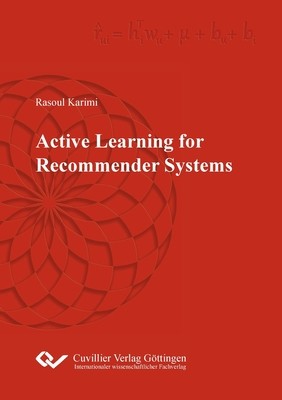
- We will send in 10–14 business days.
- Author: Rasoul Karimi
- Publisher: Cuvillier
- ISBN-10: 395404692X
- ISBN-13: 9783954046928
- Format: 14.8 x 21 x 0.8 cm, minkšti viršeliai
- Language: English
- SAVE -10% with code: EXTRA
Reviews
Description
Nowadays we are living in an era that is overloaded with information. Decision-making in this environment can sometimes become a nightmare. There are too many choices and we simply cannot explore them all. Therefore, it would be really helpful to have a system to help us to find the right choice. Such systems, which learn user preferences and provide personalized recommendations to them are called Recommender Systems. Evidently, the performance of recommender systems depends on the amount of information that users provide regarding items, most often in the form of ratings. This problem is amplified for new users because they have not provided any rating, which impacts negatively on the quality of generated recommendations. This problem is called new user problem or cold-start problem. A simple and effective way to overcome this problem, is by posing queries to new users so that they express their preferences about selected items, e.g. by rating them. Nevertheless, the selection of items must take into consideration that users are not willing to answer a lot of such queries. To address this problem, active learning methods have been proposed to acquire the most informative ratings, i.e ratings from users that will help most in determining their interests. The aim of this thesis is to take inspiration from the literature of active learning for machine learning and develop new methods for the new user problem in recommender systems. In the recommender system context, new users play the role of the Oracle and provide labels (ratings) to the queries (items). In this approach, we will take into consideration that although there are no data for new users, but there is abundant data for existing users. Such additional data can help us to develop scalable and accurate active learning methods for the new user problem in recommender systems. The thesis consists of two parts. In the first part, to be consistent with the settings of active learning in machine learning and the re
EXTRA 10 % discount with code: EXTRA
The promotion ends in 21d.08:49:48
The discount code is valid when purchasing from 10 €. Discounts do not stack.
- Author: Rasoul Karimi
- Publisher: Cuvillier
- ISBN-10: 395404692X
- ISBN-13: 9783954046928
- Format: 14.8 x 21 x 0.8 cm, minkšti viršeliai
- Language: English English
Nowadays we are living in an era that is overloaded with information. Decision-making in this environment can sometimes become a nightmare. There are too many choices and we simply cannot explore them all. Therefore, it would be really helpful to have a system to help us to find the right choice. Such systems, which learn user preferences and provide personalized recommendations to them are called Recommender Systems. Evidently, the performance of recommender systems depends on the amount of information that users provide regarding items, most often in the form of ratings. This problem is amplified for new users because they have not provided any rating, which impacts negatively on the quality of generated recommendations. This problem is called new user problem or cold-start problem. A simple and effective way to overcome this problem, is by posing queries to new users so that they express their preferences about selected items, e.g. by rating them. Nevertheless, the selection of items must take into consideration that users are not willing to answer a lot of such queries. To address this problem, active learning methods have been proposed to acquire the most informative ratings, i.e ratings from users that will help most in determining their interests. The aim of this thesis is to take inspiration from the literature of active learning for machine learning and develop new methods for the new user problem in recommender systems. In the recommender system context, new users play the role of the Oracle and provide labels (ratings) to the queries (items). In this approach, we will take into consideration that although there are no data for new users, but there is abundant data for existing users. Such additional data can help us to develop scalable and accurate active learning methods for the new user problem in recommender systems. The thesis consists of two parts. In the first part, to be consistent with the settings of active learning in machine learning and the re


Reviews